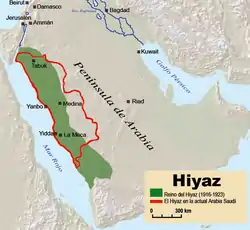Sharifian Caliphate
The Sharifian Caliphate (Arabic: الخلافة الشريفية) was a caliphate proclaimed by the Sharifian rulers of the Hashemite Kingdom of the Hejaz in 1924, in lieu of the recently-abolished Ottoman Caliphate.
Sharifian Caliphate | |||||||||
|---|---|---|---|---|---|---|---|---|---|
| 1924–1925 | |||||||||
 Coat of arms
| |||||||||
 Map with the kingdom in green and the current region in red. | |||||||||
| Status | Unrecognized caliphate | ||||||||
| Capital | Mecca (de facto) | ||||||||
| Common languages | Arabic | ||||||||
| Religion | Sunni Islam | ||||||||
| Government | Caliphate | ||||||||
| Sharifian Caliph | |||||||||
• 1924 | Hussein bin Ali | ||||||||
| Historical era | Interwar period | ||||||||
• Foundation | 3 March 1924 | ||||||||
• Disestablished | 19 December 1925 | ||||||||
| Currency | Hejaz riyal | ||||||||
| |||||||||
| Today part of | Saudi Arabia | ||||||||
History
The concept of an Sharifian Caliphate had been pondered since at least the 15th century.[1]: 42 Towards the end of the 19th century, the prospects for a potential Sharifian Caliphate grew more realistic due to the decline of the Ottoman Empire, which had been heavily defeated in the Russo-Turkish War of 1877–1878. There is little evidence, however, that the idea of a Sharifian Caliphate ever gained wide grassroots support in the Middle East or anywhere else for that matter.[1]: 43–44
The Ottoman sultanate was abolished on 1 November 1922, at the close of the Turkish War of Independence. The office of caliph, however, was retained for an additional sixteen months, during which it was held by Abdülmecid II. He served as caliph under the patronage of the newly founded Turkish Republic until 3 March 1924, when the Grand National Assembly of Turkey formally abolished the caliphate. Hussein bin Ali then proclaimed himself caliph,[1]: 241 basing his claim on his prophetic ancestry and his control of Islam's two holiest mosques, the Grand Mosque of Mecca and the Prophet's Mosque in Medina (collectively known as the Haramayn, Arabic: الحرمين, lit. 'the two shrines'). Possession of the Haramayn was an indispensable condition for any caliph.[1]: 12 According to The Times, Mehmed VI, the last Ottoman sultan and penultimate Ottoman caliph, sent a telegraph of support to Hussein after he had proclaimed himself caliph.[1]: 240 Nevertheless, King Hussein's caliphate failed to receive wide recognition from the still-colonial Arab world and it was ended when the Hashemite family had to flee the Hejaz region after its capture by the Najdi Ikhwan forces of Ibn Saud (the founder of today's Saudi Arabia) in 1924–1925.[1]: 248
A last attempt at restoring the caliphal office and style with ecumenical recognition was made by al-Ḥusayn ibn ‘Alī al-Hāshimī, King of Hejaz and Sharif of Mecca, who assumed both on 11 March 1924 and held them until 3 October 1924, when he passed the kingship to his son `Ali ibn al-Husayn al-Hashimi, who did not adopt the caliphal office and style.[2]: 118
References
- Teitelbaum, Joshua (2001). The Rise and Fall of the Hashimite Kingdom of Arabia. C. Hurst & Co. Publishers. ISBN 9781850654605.
Ochsenwald has written that the vilayet of Hijaz was perhaps 'the Arab province most valuable to the Ottoman Sultan.' Possession of the Haramayan was a sine qua non for any sultan-caliph, and to be seen as the defender and benefactor of Islam's two holies cities was fundamental to the legitimacy and prestige of the ruler.
- Bosworth, Clifford Edmund (2004). The New Islamic Dynasties: A Chronological and Genealogical Manual. Edinburgh University Press. ISBN 978-0-7486-2137-8.
.svg.png.webp)